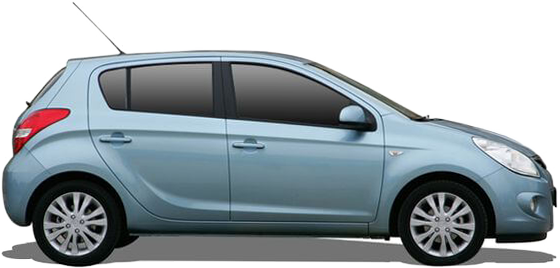The Comparative Analysis :
Hyundai i20 1.6 LPG Automatic (Autogas) (10 - 10) vs. Renault Clio ENERGY TCe 90 99g Eco-Drive (12 - 14)
€ 20,600

€ 14,400

€ 20,600
Base Price ⓘBase price of a new vehicle with standard equipment in Germany at market launch.
€ 14,400
ⓘBase price of a new vehicle with standard equipment in Germany at market launch. Price Info
Vehicle Dimensions
The dimensions of these vehicles differ slightly. The Hyundai i20 1.6 LPG is 4.8 inches shorter, 0.9 inches narrower and 1.7 inches taller than the Renault Clio ENERGY TCe 90 Start & Stop 99g.
Hyundai i20 1.6 LPG
Renault Clio ENERGY TCe 90 Start & Stop 99g
58.7
67.3
78.1
57
68.2
76.6
67.3 in
Width
68.2 in
78.1 in
Width Incl. Mirrors
76.6 in
58.7 in
Height
57 in
99.4
155.1
101.9
160
155.1 in
Length
160 in
99.4 in
Wheelbase
101.9 in
Vehicle Weight
Hyundai i20 1.6 LPG
Renault Clio ENERGY TCe 90 Start & Stop 99g
2524 lb
Curb Weight
2390 lb
3450 lb
Gross Vehicle
Weight
Weight
3501 lb

Weight Difference:
134 lb
5.31 %

General
Hyundai i20 1.6 LPG
Renault Clio ENERGY TCe 90 Start & Stop 99g
PB
Generation
X98
Hatchback
Car Body Style
Hatchback
Autogas (LPG)
Fuel Type
Mid-Grade Unleaded

Front-wheel drive
Drivetrain
Front-wheel drive

4-speed automatic transmission
Transmission
5-speed manual transmission
Engine
Hyundai i20 1.6 LPG
Renault Clio ENERGY TCe 90 Start & Stop 99g
Straight-four engine (naturally aspirated engine)
Engine Type
Straight-three gasoline engine with turbocharger
4
Valves
4
4
Cylinders
3
1.6 L / 78 cu in
Displacement
0.9 L / 44 cu in
118 hp
at 6300 rpm
Power
89 hp
at 5250 rpm
Hyundai i20 1.6 LPG
118 hp
89 hp
Renault Clio ENERGY TCe 90 Start & Stop 99g
116 lb‑ft
at 4200 rpm
Max. Torque
100 lb‑ft
at 2500 rpm
Hyundai i20 1.6 LPG
116 lb‑ft
100 lb‑ft
Renault Clio ENERGY TCe 90 Start & Stop 99g
Performance
Hyundai i20 1.6 LPG
Renault Clio ENERGY TCe 90 Start & Stop 99g
109 mph
Maximum Speed
115 mph
11.4 sec
Acceleration 0 to 62 mph
13 sec
62 mph
62
mph
mph
518 ft
0.000 sec

Hyundai i20 1.6 LPG
62 mph
62
mph
mph
594 ft
0.000 sec

Renault Clio ENERGY TCe 90 Start & Stop 99g
▶ REPLAY
21.39 lb/hp
Weight-to-Power Ratio
26.85 lb/hp
Hyundai i20 1.6 LPG
21.39 lb/hp
26.85 lb/hp
Renault Clio ENERGY TCe 90 Start & Stop 99g
Fuel Economy / Emissions
Hyundai i20 1.6 LPG
Renault Clio ENERGY TCe 90 Start & Stop 99g
Fuel Economy
28 mpg
combined
55 mpg
Hyundai i20 1.6 LPG
28 mpg
55 mpg
Renault Clio ENERGY TCe 90 Start & Stop 99g
22 mpg
city
44 mpg
34 mpg
highway
64 mpg
10 gal
Fuel Tank Capacity
10.6 gal
281 mi
Range
578 mi
Hyundai i20 1.6 LPG
281 mi
578 mi
Renault Clio ENERGY TCe 90 Start & Stop 99g
Environmental Impact
123.9 kWh
Total Energy Consumption
per 100 miles ⓘThe total energy consumption per 100 miles is the amount of energy consumed by a vehicle when burning fuel or using electricity per 100 miles (final energy), and the energy required to produce the appropriate amount of fuel or electricity (primary energy).
per 100 miles ⓘThe total energy consumption per 100 miles is the amount of energy consumed by a vehicle when burning fuel or using electricity per 100 miles (final energy), and the energy required to produce the appropriate amount of fuel or electricity (primary energy).
81.4 kWh
Hyundai i20 1.6 LPG
123.9 kWh
81.4 kWh
Renault Clio ENERGY TCe 90 Start & Stop 99g
Euro 4
Emission Standard
Euro 5
219 g/mi (NEFZ)
CO2 Emissions
159 g/mi (NEFZ)
Practical Convenience
Hyundai i20 1.6 LPG
Renault Clio ENERGY TCe 90 Start & Stop 99g
3
Doors
5
5
No. of Seats
5
926 lb
Maximum Payload
1111 lb
8.4 cu ft
Trunk Volume
8.5 cu ft







30 cu ft
Cargo Volume (Seats Down)
32.5 cu ft















